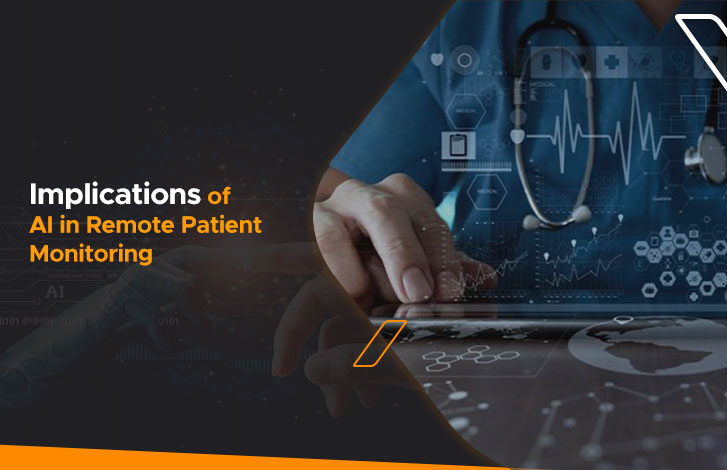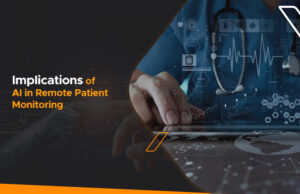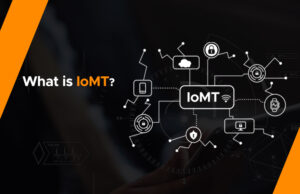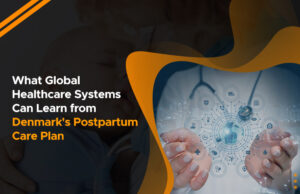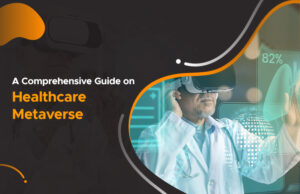Emergence of AI in Healthcare
Artificial intelligence has taken the world by storm. It has revolutionized many industries, including healthcare. AI aims to increase the precision and effectiveness of healthcare delivery while improving patient outcomes with the help of advanced AI techniques, including machine learning, deep learning, and natural language processing.
AI helps providers and medical professionals in the processing and analysis of enormous amounts of medical data, health records, and medical pictures using machine learning algorithms. Healthcare professionals can use AI to find patterns in patient data, which helps them make more accurate diagnoses and better treatment plans.
Medical imaging analysis is another important use of AI in the healthcare industry. AI can accurately diagnose patients using deep learning algorithms to analyze millions of medical photos, saving time and effort compared to manual analysis.
AI also helps in personalizing patient treatment and enhancing the patient experience. Healthcare professionals can improve patient outcomes and satisfaction by using AI algorithms to customize treatments and care plans. It has the power to transform research. AI can assist researchers in identifying new drug targets and better understanding the causes of diseases, resulting in new and more effective treatments.
AI in Remote Patient Monitoring
Artificial intelligence (AI) is increasingly being used in healthcare. Similarly, it is also being used for remote patient monitoring. Remote patient monitoring (RPM) helps clinicians keep track of patients with acute or chronic illnesses remotely, elderly individuals receiving in-home care, and even hospitalized patients. RPM has improved patient outcomes by incorporating AI, making it a helpful tool for healthcare professionals managing chronic illnesses.
An important use of AI in RPM is real-time patient health monitoring. This helps in the early detection of severe health issues. AI-powered RPM allows patients to take charge of their health, helping them play an active role in their treatment. It helps them make informed decisions about their own care and communicate with their providers. With the help of RPM, providers can continually track a patient’s vital signs, medication compliance, and other important health indicators. It also helps healthcare professionals manage chronic diseases more effectively. Healthcare professionals can use AI to track a patient’s development, spot any possible health problems, and modify the patient’s treatment plan as necessary.
A recent technological revolution in RPM involves embedded vision. Modern embedded vision cameras help record high-quality imagery despite the lighting in a patient’s room. This not only helps improve remote monitoring but also enables medical professionals to monitor several patients simultaneously. These cameras can offer incredibly detailed behavioral analysis. Staff can monitor patient movements to spot any strange behaviors or worsening of symptoms.
Concerns
Although AI has the potential to revolutionize healthcare, there are some issues and problems that must be resolved. AI needs enormous amounts of medical data, which raises questions regarding data security and privacy. The application of AI in healthcare raises further ethical issues, such as the necessity for regulatory monitoring and the possibility of bias. It is crucial to address these issues to make the most of AU in healthcare. To set ethical principles, maintain data privacy and security, and promote transparency and accountability, will require cooperation between healthcare providers, policymakers, and technology businesses. Some of the major concerns include:
Privacy concerns
AI-powered RPM gives rise to concerns regarding patient privacy. Not all patients are comfortable using embedded vision data due to its vulnerability to attacks and lack of control over its use. 3D mapping technology can help tackle this. These make it possible to monitor patients’ movements without gathering color or video data. Based on depth data, AI systems are trained to detect falls, offering patients more privacy and peace of mind.
Ethical concern
The application of AI in healthcare raises ethical issues, such as the possibility of bias in algorithms and the requirement for regulatory monitoring. AI-powered RPM could result in unequal access to healthcare.
Jobs
It also raises concerns regarding the employment of human doctors as well as possible effects on the labor market. Some people worry that artificial intelligence (AI) will replace doctors, while others claim that AI will help doctors do their jobs better. However, the verdict remains unclear as AI has yet to bloom fully.
Lack of transparency
Evaluating the accuracy of AI-based diagnostic tools and predictive models is challenging because the algorithms are proprietary. This hurts the reputation of AI-based healthcare solutions as there is a lack of openness.
Adoption
Adopting and integrating AI-based healthcare technologies into current healthcare systems can give rise to resistance. This might be due to a lack of knowledge about the potential advantages of AI or worries about the expense and difficulty of deployment.
Conclusion
The use of AI in RPM is changing how patients are treated and monitored. AI has the ability to enhance patient outcomes, boost efficiency, and lower healthcare costs by enhancing illness diagnosis and management, creating personalized treatment plans, processing and analyzing EHRs more quickly, and remotely monitoring patients. Healthcare professionals can make better decisions and enhance patient outcomes with the help of AI algorithms and deep learning techniques.

